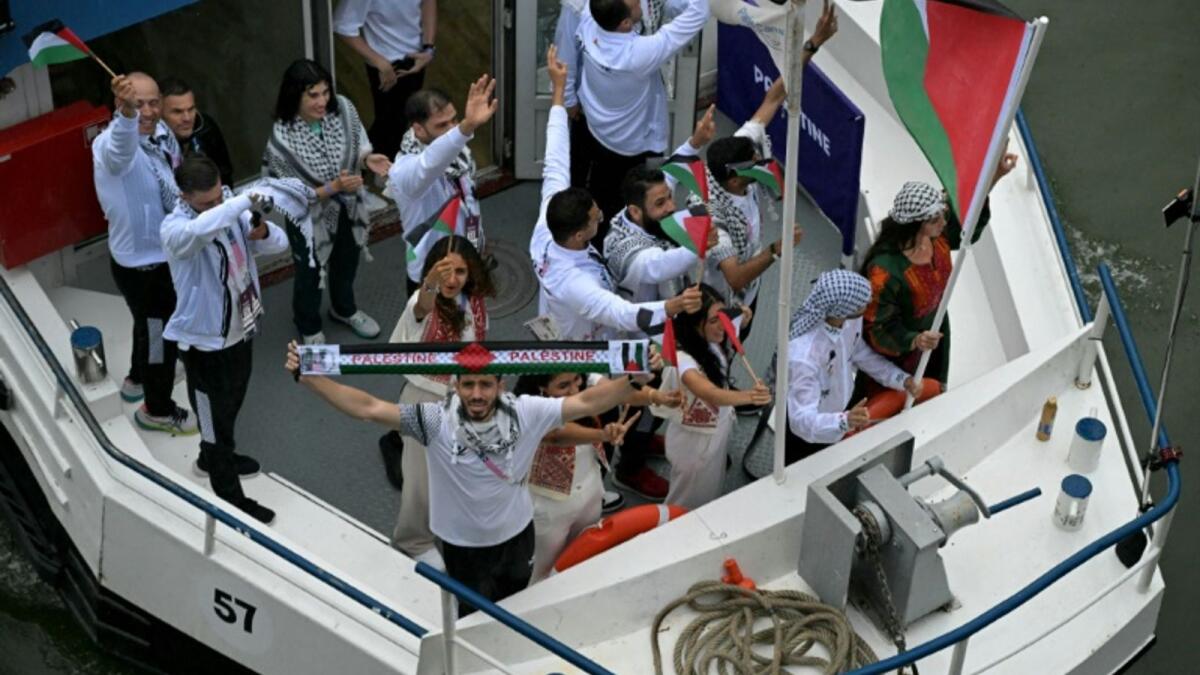Waseem Abu Sal, a Palestinian boxer, made a bold statement during the opening ceremony of the Paris Olympics by wearing a shirt depicting images of warplanes dropping missiles over children playing sports. Abu Sal, one of the flag-bearers for the Palestinian delegation, wore the shirt during the river parade along the Seine on a rainy day. The shirt symbolizes the current situation in Palestine, with children being martyred and left without food or water due to ongoing conflicts. Abu Sal’s decision to wear this shirt was a test for event organizers, who have strict rules against political statements.
Abu Sal’s shirt sparked controversy and raised questions about whether it violated Olympic regulations. Jibril Rajoub, president of the Palestine Olympic Committee, clarified that the shirt was intended as a message of peace and to draw attention to the suffering of civilians in Gaza. The International Olympic Committee prohibits political statements during sports events, but athletes are allowed to express themselves through other mediums such as press conferences and social media. The Palestine Olympic Committee had previously written to the IOC requesting a ban on Israeli athletes at the Paris Olympics, a request that was denied.
Abu Sal, a 20-year-old boxer, received a wildcard entry for the Olympics but faces challenges in training due to logistical restrictions. He currently lives in the West Bank and is unable to train with his coach based in Cairo, as the coach cannot travel to him due to Israeli restrictions. Despite these challenges, Abu Sal remains focused on representing Palestine and raising awareness about the situation in Gaza. The decision to wear the controversial shirt was a deliberate choice to bring attention to the struggles faced by Palestinian civilians.
The Paris Olympics serve as a platform for athletes to showcase their talent and represent their countries on a global stage. Abu Sal’s participation in the boxing event highlights the resilience and determination of Palestinian athletes in overcoming obstacles to pursue their passion for sports. His act of defiance in wearing the politically charged shirt underscores the power of athletes to use their platform for social and political advocacy. As the world watches the Olympic Games, Abu Sal’s shirt serves as a stark reminder of the harsh realities faced by many individuals around the globe.
The tragic events that have unfolded in Gaza, resulting in the loss of thousands of lives, have deeply affected the Palestinian community. Abu Sal’s symbolic gesture during the Paris Olympics resonates with many individuals who are seeking justice and peace in the region. The shirt adorned with images of warplanes and missiles conveys a powerful message about the impact of conflict on innocent lives, particularly children who are caught in the crossfire. By wearing this shirt, Abu Sal is not only representing his country but also shedding light on the human rights violations that continue to occur in the region.
In conclusion, Waseem Abu Sal’s decision to wear a shirt depicting images of war and devastation during the Paris Olympics opening ceremony has sparked discussions about politics, activism, and the power of sport to bring about change. Despite facing challenges in training and competing, Abu Sal remains determined to use his platform as an athlete to raise awareness about the plight of Palestinians. His actions serve as a reminder of the ongoing struggles faced by individuals in conflict zones around the world and highlight the importance of using one’s voice to advocate for peace and justice. In a world where sports and politics often converge, Abu Sal’s shirt stands as a symbol of resilience and resistance against oppression.











